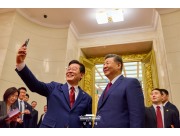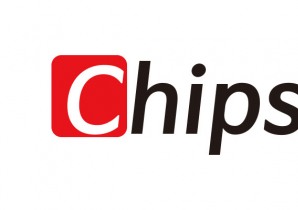LG Corp. shares rose 4.7% this year, climbing from 72,200 won at the start of the year to 75,600 won as of the closing price on June 16. This pales in comparison to other holding companies that have soared over the same period: LS (89.3%), HD Hyundai (59.6%), CJ (56.9%), and SK (52.3%). Even GS, which spun off from LG and whose affiliates have struggled, climbed 23.7%.

LG is a pure holding company that does not run its own business operations. Last year, most of its separate revenue of 932 billion KRW came from subsidiaries. The breakdown: 432 billion KRW in dividends, 356 billion KRW in trademark royalties, and 143 billion KRW in rental income from investment properties.
Its main subsidiaries (ownership stakes) include LG CNS (49.95%), LG Electronics (31.07%), LG Chem (30.69%), LG Uplus (37.66%), LG Household & Health Care (30.0%), and HS Ad (35.0%). With the electronics and chemical/battery sectors suffering from weak demand and policy uncertainty in the U.S., expectations for an earnings rebound are low.
However, the recent surge in holding company stocks is largely attributed to policy expectations from the new administration, which has pledged to boost shareholder value and the stock market through measures like amending the Commercial Act.
Through its value-up plan announced late last year, LG raised its minimum dividend payout ratio (based on separate net income, excluding non-recurring gains) from at least 50% to at least 60%. It also announced it would cancel all treasury shares (3.85% of shares, worth about 500 billion KRW) by next year. Still, some argue that “shareholder returns remain insufficient” to drive up the stock price, especially as cash inflows from subsidiaries dwindle.
Some analysts attribute the sluggish share price to a “lack of trust from the market.” In particular, there has been shareholder backlash over frequent subsidiary listings.
LG CNS was listed on the KOSPI in February this year. Even before the IPO, LG Corp. shareholders were concerned about dilution of shareholder value.
In response, LG CNS CEO Hyun Shin-kyun personally stated, “We will be able to deliver benefits to LG Corp. shareholders by enhancing corporate value.”
On the other hand, Kim Jang-won, a researcher at BNK Investment & Securities, wrote in a pre-IPO report, “When LG CNS was unlisted, there was a direct reason to invest in LG, but after the listing, that role has ended,” adding, “It is hard to expect unlisted companies to serve as substitutes for LG CNS now.”
Gwak Horyung (horr@fntimes.com)



























![[DCM] 이마트, 대표주관사 NH·한국·삼성·키움증권 전부 교체…시장조달 신중모드](https://cfnimage.commutil.kr/phpwas/restmb_setimgmake.php?pp=006&w=69&h=45&m=5&simg=2026011300431301013a837df6494123820583.jpg&nmt=18)







![강남구 ‘디에이치자이개포' 45평, 5.5억 상승한 51.5억원에 거래 [일일 신고가]](https://cfnimage.commutil.kr/phpwas/restmb_setimgmake.php?pp=006&w=69&h=45&m=5&simg=2025061908193804321e41d7fc6c2183101242202.jpg&nmt=18)













![[카드뉴스] 주식·채권·코인까지 다 오른다, 에브리싱 랠리란 무엇일까?](https://cfnimage.commutil.kr/phpwas/restmb_setimgmake.php?pp=006&w=298&h=298&m=1&simg=202601071630263763de68fcbb3512411124362_0.jpg&nmt=18)
![[카드뉴스] “이거 모르고 지나치면 손해입니다… 2025 연말정산 핵심 정리”](https://cfnimage.commutil.kr/phpwas/restmb_setimgmake.php?pp=006&w=298&h=298&m=1&simg=202601061649137526de68fcbb3512411124362_0.jpg&nmt=18)
![[카드뉴스] KT&G, 제조 부문 명장 선발, 기술 리더 중심 본원적 경쟁력 강화](https://cfnimage.commutil.kr/phpwas/restmb_setimgmake.php?pp=006&w=298&h=298&m=1&simg=202509241142445913de68fcbb3512411124362_0.png&nmt=18)
![[카드뉴스] KT&G ‘Global Jr. Committee’, 조직문화 혁신 방안 제언](https://cfnimage.commutil.kr/phpwas/restmb_setimgmake.php?pp=006&w=298&h=298&m=1&simg=202503261121571288de68fcbb3512411124362_0.png&nmt=18)

![[신간] 고수의 M&A 바이블](https://cfnimage.commutil.kr/phpwas/restmb_setimgmake.php?pp=006&w=81&h=123&m=5&simg=2025091008414900330f8caa4a5ce12411124362.jpg&nmt=18)
![[신간] 리빌딩 코리아 - 피크 코리아 극복을 위한 생산성 주도 성장 전략](https://cfnimage.commutil.kr/phpwas/restmb_setimgmake.php?pp=006&w=81&h=123&m=5&simg=2025032814555807705f8caa4a5ce12411124362.jpg&nmt=18)
![[서평] 추세 매매의 대가들...추세추종 투자전략의 대가 14인 인터뷰](https://cfnimage.commutil.kr/phpwas/restmb_setimgmake.php?pp=006&w=81&h=123&m=5&simg=2023102410444004986c1c16452b0175114235199.jpg&nmt=18)

![[신간] 이게 화낼 일인가?](https://cfnimage.commutil.kr/phpwas/restmb_setimgmake.php?pp=006&w=81&h=123&m=5&simg=2026010610254801367f8caa4a5ce12411124362.jpg&nmt=18)
![[신간] 조금 느려도 괜찮아...느림 속에서 발견한 마음의 빛깔](https://cfnimage.commutil.kr/phpwas/restmb_setimgmake.php?pp=006&w=81&h=123&m=5&simg=20251105082239062852a735e27af12411124362.jpg&nmt=18)

![[AD] 현대차, 글로벌 안전평가 최고등급 달성 기념 EV 특별 프로모션](https://cfnimage.commutil.kr/phpwas/restmb_setimgmake.php?pp=006&w=89&h=45&m=1&simg=20260106160647050337492587736121125197123.jpg&nmt=18)
![[AD] 현대차 ‘모베드’, CES 2026 로보틱스 부문 최고혁신상 수상](https://cfnimage.commutil.kr/phpwas/restmb_setimgmake.php?pp=006&w=89&h=45&m=1&simg=20260105103413003717492587736121125197123.jpg&nmt=18)
![[AD] 기아 ‘PV5’, 최대 적재중량 1회 충전 693km 주행 기네스 신기록](https://cfnimage.commutil.kr/phpwas/restmb_setimgmake.php?pp=006&w=89&h=45&m=1&simg=20251105115215067287492587736121125197123.jpg&nmt=18)
![[카드뉴스] KT&G, 제조 부문 명장 선발, 기술 리더 중심 본원적 경쟁력 강화](https://cfnimage.commutil.kr/phpwas/restmb_setimgmake.php?pp=006&w=89&h=45&m=1&simg=202509241142445913de68fcbb3512411124362_0.png&nmt=18)
![[AD]‘황금연휴에 즐기세요’ 기아, ‘미리 추석 페스타’ 이벤트 실시](https://cfnimage.commutil.kr/phpwas/restmb_setimgmake.php?pp=006&w=89&h=45&m=1&simg=20250903093618029117492587736121166140186.jpg&nmt=18)




